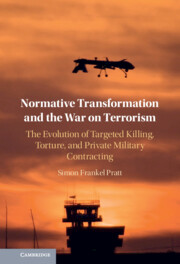 Normative Transformation and the War on Terrorism
Normative Transformation and the War on Terrorism 5 - Case 2
‘Enhanced Interrogation’ and the Prohibition on Torture
Published online by Cambridge University Press: 06 January 2022
Summary
In Chapter 5, I investigate the emergence, institutionalisation, and cessation of the US use of torture during interrogation, in the form of ‘Enhanced Interrogation Techniques’ developed for the CIA’s detention and interrogation programme. I question whether this represents the erosion of international and domestic prohibitions on torture and find that it does not; they too continue to exist, but temporarily transformed, before reverting back to their earlier form. This process occurred because the CIA developed a new ‘science’ of interrogation and placed it at the centre of new institutional capacities to detain and interrogate ‘high-value’ prisoners, which they justified on the basis of its scientific validity and efficacy. Their legal and scientific arguments revolved around distinguishing their activities from torture, which they never claimed was appropriate but also never admitted to using. As these justifications increasingly failed, the use of EITs stopped and was again prohibited.
- Type
- Chapter
- Information
- Normative Transformation and the War on TerrorismThe Evolution of Targeted Killing, Torture, and Private Military Contracting, pp. 86 - 119Publisher: Cambridge University PressPrint publication year: 2022


